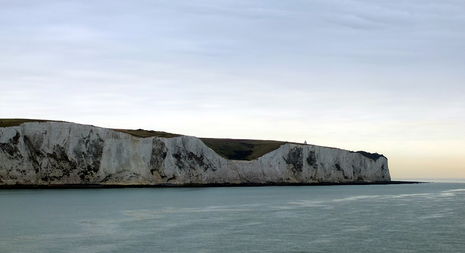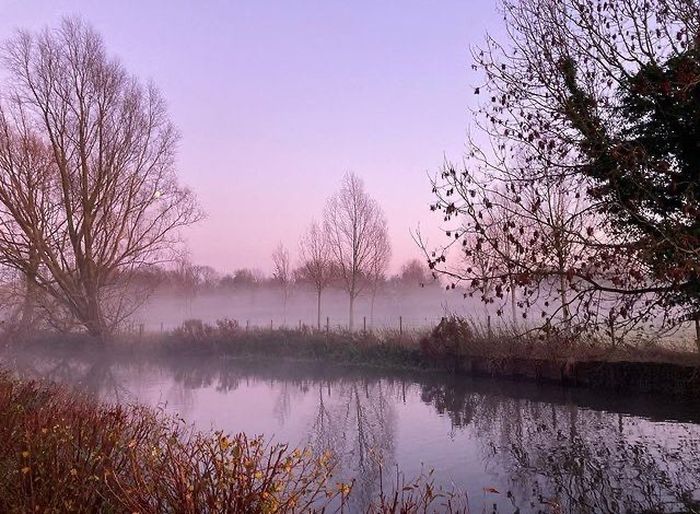The Varsity Channel Race and its legendary history
Looking back over the last 150 years, Dan Shailer explores the mythical history of cross-Channel races and the origins of the open-water swimming Varsity competition.

Since Captain Matthew Webb made the first crossing in 1875, the English Channel has been a personal testing ground for open-water swimmers around the world. Thought of as the ‘Mount Everest’ of endurance swimming, the idea of racing across might seem at best pointless and at worst dangerous: 21 miles of unpredictable tides, tankers and jellyfish. But competition has always been at home in this storied stretch of water. Even Captain Webb had a rival in the American Showman Captain Paul Boyton. More than a decade of sharks, tall stories and painful swims later, Oxford and Cambridge are the only two teams to regularly face off across the Channel in a unique biannual Varsity event. After lockdown intervened last year, both teams are raring to put their mark on the legendary history of racing across the Channel in June.
“What 19th century sports nutrition lacks in scientific credentials, it makes up in story-telling value.”
In 1875, Captain Webb was a medical marvel. In the media frenzy following his success, every possible detail from chest size (prodigious) to diet (bizarre) was celebrated in international newspapers. Such was his ability; no human alone could offer competition. Enter Paul Boyton: a rival, but not a swimmer. Boyton joined Clark Merriman to devise an inflatable rubber suit – kayaking’s answer to the recumbent bicycle. Threatening to steal Webb’s thunder, Boyton inflated up on the French coast and pointed his feet towards Dover, complete with miniature sail attachments at the end of his toes. Boyton drew from the Rocky Balboa playbook for his diet of raw eggs – plus cherry brandy and cigars.
What 19th century sports nutrition lacks in scientific credentials it makes up in story-telling value, and Webb was later fuelled to victory with beer, brandy and beef sandwiches (cut into small squares and soaked in water to slip down the swimmer’s throat without chewing). Despite failing after fifteen hours in the water, Boyton was satisfied, having proved Merriman’s life suit could stay afloat. Boyton’s attempt has been largely forgotten next to Webb’s successful swim, but the race against time to make the first crossing spurred Webb on. It was a sense of competition which would eventually push Webb to the edge, where he died trying to swim across the Whirlpool Rapids beneath Niagara Falls.
The first Channel race in 1904 was a worthy testament to Webb’s memory: all three swimmers failed. Undeterred, a further seven failed in a race the subsequent year. These were the first proper ‘races’ in the sense that swimmers would set off simultaneously and battled in a pack to reach the opposite coast (or not). These events were often sponsored for cash prizes and throughout the 1920s, the Daily Sketch offered £1,000 (approximately £45,000 today) to any swimmer who made the journey successfully. This inspired three more successes, each greeted on the beach by a giant ‘price-is-right’ style cheque and photographer.
“The upcoming race in June promises to live up to the best of friendly rivalries.”
The next race was sponsored by the Daily Mail in 1950. Over the following ten years, swimmers would come from around the world (Egypt to Argentina, the US and Scotland) to compete in legendary mob matches. Some of the stories from that first race err on the side of the mythical. Greek swimmer Panagiotis Kameros, for example, was pulled from the water after one of apparently four 15-foot sharks made a lunge; Eileen Fenton won the women’s race in 1950, after she picked up a shoulder injury and was forced to swim the last two hours with one arm. Others were not so lucky; Egyptian Fahmy Atallah passed out and was rescued from the water after swimming non-stop for 27 hours. Tragically, he was just 300 yards from the finish. It is testament to the capricious nature of the English Channel that Fenton, who went on to win the Women’s race in 1950, did not even finish the year after.
Without a sponsor, the event lapsed until 1977, when it was revived as the Arab Nations English Channel Race, organised by Prince Faisal Bin Fahd Bin Abdulaziz. This event ran until 1981 after going international in its third year. In 1979 one particular swimmer was pulled out after ten hours in the water. Kevin Murphy’s name isn’t on the list of finishers for that swim – not because he had given up, but because one crossing of the Channel was just a warmup for his upcoming attempt to swim across the Channel three ways. Kevin Murphy was also one half of the ‘Great Duel’: the most famous Channel rivalry of all time.
In 1977, Des Renford was swimming royalty, and a hero in Australia. Over the phone, Murphy tells me bluntly why he was invited to race Renford in Sydney Harbour: “They were looking for somebody to beat”. Murphy delivered an upset however, beating the Australian through shark-infested waters. Following his victory, Murphy flew to Capri for another swim and, upon returning to the UK, was surprised to find Renford (and a camera crew) waiting for him in Dover. “I didn’t know anything about it”, he says, but their race had become a trilogy. Renford was fastest across the Channel in torrid conditions but both swimmers failed to complete the third race across Loch Ness. It was settled as a draw, but Murphy tells me that, as he stayed in Loch Ness’ frigid waters a few hours longer than Des, “I like to think I ended a little ahead.” Murphy characterises his duel with Renford as “a friendly rivalry – but a rivalry nonetheless” and remembers Des as a great friend. To this day Renford’s son carries the nickname ‘Murph’, at the instigation of his father.
Since then, changing coastguard regulations and the increasing popularity of the swim have made the mob matches of the 50s and 70s untenable, but one race still takes place. In 1998, Martin Davies and a group of Oxford students challenged Cambridge to a relay race across the Channel. Then Cambridge captain, Gareth Earl, took up the challenge and, guided by an enthusiastic supporter and facilitator in Nick Thomas, both teams made it across in under ten hours. The finish was so close, in fact, that the first Oxbridge relay was declared a draw. Since then there has been one more draw, six wins to Oxford and three to Cambridge. That first race was troubled by selection issues and in the following years continuity has been an issue: Cambridge failed to field a team in 2018 and the race was cancelled in 2020 due to the national lockdown. The Varsity event also lost a great supporter when Nick Thomas passed away earlier this year. Both teams will be raising money for Cancer Research in his memory as they try to live up to the long history of racing across the Channel. The upcoming race in June – unique both amongst Varsity matches and open-water swimming – promises to live up to the best of friendly rivalries.
 Comment / Plastic pubs: the problem with Cambridge alehouses 5 January 2026
Comment / Plastic pubs: the problem with Cambridge alehouses 5 January 2026 News / Cambridge academics stand out in King’s 2026 Honours List2 January 2026
News / Cambridge academics stand out in King’s 2026 Honours List2 January 2026 News / Cambridge businesses concerned infrastructure delays will hurt growth5 January 2026
News / Cambridge businesses concerned infrastructure delays will hurt growth5 January 2026 News / AstraZeneca sues for £32 million over faulty construction at Cambridge Campus31 December 2025
News / AstraZeneca sues for £32 million over faulty construction at Cambridge Campus31 December 2025 Interviews / You don’t need to peak at Cambridge, says Robin Harding31 December 2025
Interviews / You don’t need to peak at Cambridge, says Robin Harding31 December 2025









